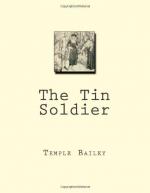But something else dawned. Embarrassment? Out of a bewildering silence she heard him say, “I am not sure, dear, that it will be best for us to marry before he goes.”
She had a stunned feeling that, quite unaccountably, Derry was failing her. A shamed feeling that she had offered herself and had been rejected.
Something of this showed in her face. “My dear, my dear,” he said, “let us go in. I can tell you better there.”
Once more in the warm sitting room with the door shut behind them, he lifted her bodily in his arms. “Don’t you know I want it,” he whispered, tensely. “Tell me that you know—”
When he set her down, his own face showed the stress of his emotion. “You are always to remember this,” he said, “that no matter what happens, I am yours, yours—always, till the end of time.”
Instinctively she felt that this Derry was in some way different from the Derry she had left the day before. There was a hint of masterfulness, a touch of decision.
“Will you remember?” he repeated, hands tight on her shoulders.
“Yes,” she said, simply.
He bent and kissed her. “Then nothing else will matter.” He placed a big chair for her in front of the fire, and drew another up in front of it. Bending forward, he took her hands. “I am glad I found you alone. What luck it was to find you alone!”
He tried then to tell her what he had come to tell. Yet, after all there was much that he left unsaid. How could he speak to her of the things he had seen in his father’s shadowed house? How fill that delicate mind with a knowledge of that which seemed even to his greater sophistication unspeakable?
So she wondered over several matters. “How can he want to marry Hilda? I can’t imagine any man wanting Hilda.”
“She is handsome in a big fine way.”
“But she is not big and fine. She is little and mean, but I could never make Daddy see it.”
He wondered if McKenzie would see it now.
Mary Connolly, coming in through the back door to her warm kitchen, heard voices. Standing in the dark hall which connected the left wing with the house, she could see through into the living room where Jean sat with her lover.
There was much dark wood and the worn red velvet—low bookshelves lining the walls, a grand piano on a cover by the window. In the dimness Jean’s copper head shone like the halo of a saint. Mary decided that Derry was “queer-looking,” until gathering courage, she went in and was warmed by his smile.
“He hasn’t had any lunch, Mary,” Jean told her, “and he wouldn’t let me get any for him.”
“I’ll have something in three whisks of a lamb’s tail,” said Mary with Elizabethan picturesqueness, and away she went on her hospitable mission.
“Marrying just now,” said Derry, picking up the subject, where he had dropped it, when Mary came in, “is out of the question.”




